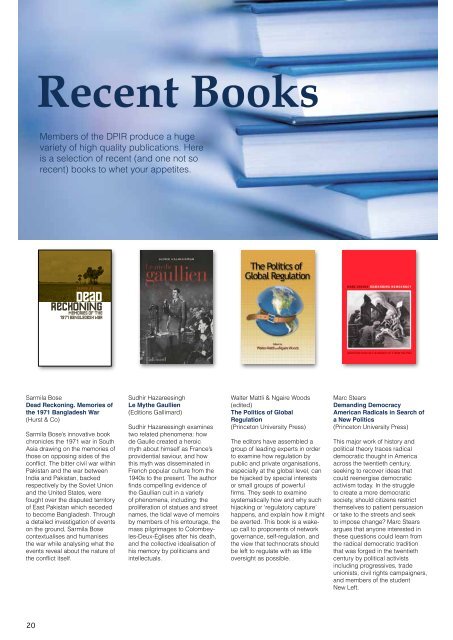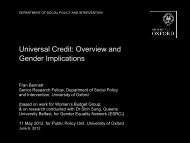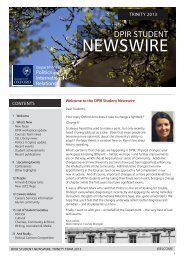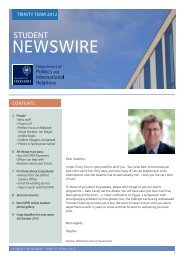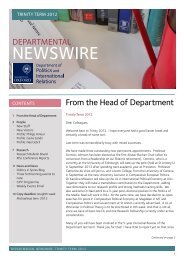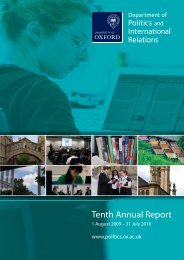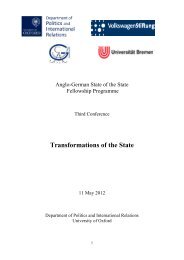Inspires - Department of Politics and International Relations ...
Inspires - Department of Politics and International Relations ...
Inspires - Department of Politics and International Relations ...
- No tags were found...
Create successful ePaper yourself
Turn your PDF publications into a flip-book with our unique Google optimized e-Paper software.
Recent BooksMembers <strong>of</strong> the DPIR produce a hugevariety <strong>of</strong> high quality publications. Hereis a selection <strong>of</strong> recent (<strong>and</strong> one not sorecent) books to whet your appetites.flicts <strong>of</strong> 1971 using factshis search for the truthurd exaggerations <strong>and</strong>n the sacrifices <strong>of</strong> 1971.factions in contemporaryhat prevent reconciliationwith Bose’s links withlitical values cannot bef recognizing historical, Pr<strong>of</strong>essor <strong>of</strong> Economics,by participants at thebeen fed by faulty memoadesh.Dead Reckoningthe facts <strong>of</strong> that tragic <strong>and</strong>for the war that stainedwaz, author <strong>of</strong> Crossedte interest in settingstudy yet <strong>of</strong> the social,akistan/Bangladesh war.e are in her debt.’n<strong>and</strong> massacre cut acrosshan Pakistani <strong>and</strong> Bengalince a correction <strong>of</strong> thescholarship. Written withterms <strong>of</strong> debate aboutrk Moses, Pr<strong>of</strong>essor at the<strong>of</strong> the Bangladesh war everhe Mujibnagar indepenngebetter than Sarmil<strong>and</strong> meticulous research.’ — Sun<strong>and</strong>a K. Datta-Ray,ISBN 978-1-84904-049-5BOSEDEAD RECKONINGHURSTSARMILA BOSEDEADRECKONINGmemories <strong>of</strong> THE1971 bangladesh war‘History emerges only slowly from thepassion-filled context <strong>of</strong> contemporaryevents. Sarmila Bose’s book sets Bangladesh’sliberation struggle at the start <strong>of</strong>this long passage.’ — David Washbrook,Senior Research Fellow, Trinity College,CambridgeThis ground-breaking book chroniclesthe 1971 war in South Asia by reconstitutingthe memories <strong>of</strong> those onopposing sides <strong>of</strong> the conflict.The year 1971 was marked by a bittercivil war within Pakistan <strong>and</strong> warbetween India <strong>and</strong> Pakistan, backedrespectively by the Soviet Union <strong>and</strong>the United States. It was fought overthe territory <strong>of</strong> East Pakistan, whichseceded to become Bangladesh.Through a detailed investigation <strong>of</strong>events on the ground, Sarmila Bosecontextualises <strong>and</strong> humanises the warwhile analysing what the events revealabout the nature <strong>of</strong> the conflict itself.The story <strong>of</strong> 1971 has so far beendominated by the narrative <strong>of</strong> thevictorious side. All parties to the warare still largely imprisoned by wartimepartisan mythologies. Bose reconstructsevents via interviews conductedin Bangladesh <strong>and</strong> Pakistan, published<strong>and</strong> unpublished reminiscencesin Bengali <strong>and</strong> English <strong>of</strong> participantson all sides, <strong>of</strong>ficial documents, foreignmedia reports <strong>and</strong> other sources.Her book challenges assumptionsabout the nature <strong>of</strong> the conflict, <strong>and</strong>exposes the ways in which the 1971conflict is still playing out in the region.9 781849 040495Sarmila BoseDead Reckoning. Memories <strong>of</strong>the 1971 Bangladesh War(Hurst & Co)Sarmila Bose’s innovative bookchronicles the 1971 war in SouthAsia drawing on the memories <strong>of</strong>those on opposing sides <strong>of</strong> theconflict. The bitter civil war withinPakistan <strong>and</strong> the war betweenIndia <strong>and</strong> Pakistan, backedrespectively by the Soviet Union<strong>and</strong> the United States, werefought over the disputed territory<strong>of</strong> East Pakistan which secededto become Bangladesh. Througha detailed investigation <strong>of</strong> eventson the ground, Sarmila Bosecontextualises <strong>and</strong> humanisesthe war while analysing what theevents reveal about the nature <strong>of</strong>the conflict itself.Sudhir HazareesinghLe Mythe Gaullien(Editions Gallimard)Sudhir Hazareesingh examinestwo related phenomena: howde Gaulle created a heroicmyth about himself as France’sprovidential saviour, <strong>and</strong> howthis myth was disseminated inFrench popular culture from the1940s to the present. The authorfinds compelling evidence <strong>of</strong>the Gaullian cult in a variety<strong>of</strong> phenomena, including: theproliferation <strong>of</strong> statues <strong>and</strong> streetnames, the tidal wave <strong>of</strong> memoirsby members <strong>of</strong> his entourage, themass pilgrimages to Colombeyles-Deux-Églisesafter his death,<strong>and</strong> the collective idealisation <strong>of</strong>his memory by politicians <strong>and</strong>intellectuals.Walter Mattli & Ngaire Woods(edited)The <strong>Politics</strong> <strong>of</strong> GlobalRegulation(Princeton University Press)The editors have assembled agroup <strong>of</strong> leading experts in orderto examine how regulation bypublic <strong>and</strong> private organisations,especially at the global level, canbe hijacked by special interestsor small groups <strong>of</strong> powerfulfirms. They seek to examinesystematically how <strong>and</strong> why suchhijacking or ‘regulatory capture’happens, <strong>and</strong> explain how it mightbe averted. This book is a wakeupcall to proponents <strong>of</strong> networkgovernance, self-regulation, <strong>and</strong>the view that technocrats shouldbe left to regulate with as littleoversight as possible.Marc StearsDem<strong>and</strong>ing DemocracyAmerican Radicals in Search <strong>of</strong>a New <strong>Politics</strong>(Princeton University Press)This major work <strong>of</strong> history <strong>and</strong>political theory traces radicaldemocratic thought in Americaacross the twentieth century,seeking to recover ideas thatcould reenergise democraticactivism today. In the struggleto create a more democraticsociety, should citizens restrictthemselves to patient persuasionor take to the streets <strong>and</strong> seekto impose change? Marc Stearsargues that anyone interested inthese questions could learn fromthe radical democratic traditionthat was forged in the twentiethcentury by political activistsincluding progressives, tradeunionists, civil rights campaigners,<strong>and</strong> members <strong>of</strong> the studentNew Left.20


